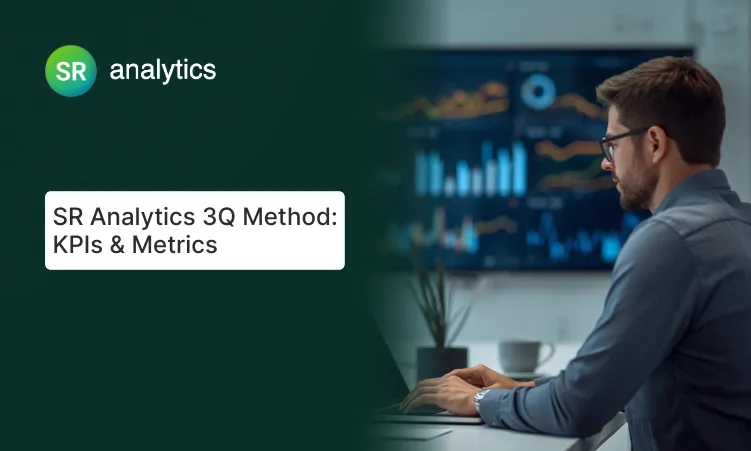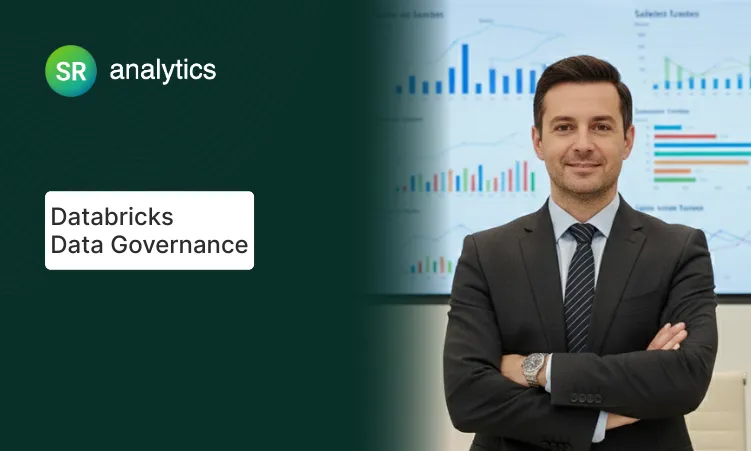Highlights
- Data analytics consulting delivers measurable ROI within 3-6 months through improved decision-making and operational efficiency
- Organizations leveraging analytics are 23x more likely to acquire customers and 19x more likely to be profitable
- Modern analytics goes beyond reporting with predictive forecasting and prescriptive recommendations for optimal business outcomes
- The $17.7 trillion potential value across industries makes analytics consulting essential for competitive advantage
- Our systematic implementation process transforms raw data into strategic insights with phased milestones and quick wins
- Expert consultants build scalable infrastructure, train teams, and establish data-driven cultures beyond just technology deployment
Have you ever wondered how Netflix recommends movies based on your watch history? Or how Amazon notifies you when products you search for go on sale? It’s data and analytics!
In today’s world, data is like gold. If a business knows how to use it, it’s sure to boom and stay ahead of competitors. And there comes the role of data analytics consulting services.
Your Competitors Are Already Making Better Decisions. Here’s Why.
Your sales reports show revenue fluctuations, but you can’t pinpoint why. Your marketing campaigns generate leads, but you’re unsure which channels deliver the best ROI. Your inventory costs are climbing, yet stockouts still happen.
These aren’t random problems. They’re symptoms of a data gap.
In 2024, data isn’t just an asset—it’s the foundation of competitive advantage. Yet most businesses struggle to extract actionable insights from their data. That’s where data analytics consulting makes the difference.
Key Insight: Data analytics consulting transforms raw business data into strategic insights that drive growth. Expert consultants help organizations implement analytics frameworks, build scalable data infrastructure, and create actionable dashboards. Companies working with data analytics consulting firms see measurable ROI within 3-6 months through improved decision-making, operational efficiency, and revenue growth.
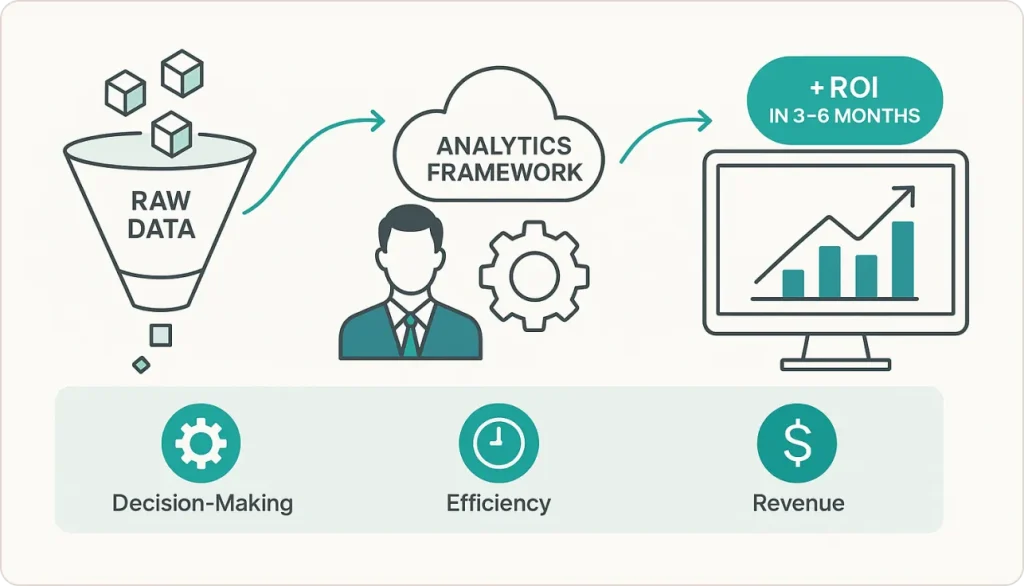
What Are Data Analytics Consulting?
Data consulting services help you gather your raw data, give shape to it in a meaningful way, and utilize it. Be it keeping track of your customers’ behavior, predicting sales, or planning the best marketing strategy; data consultants can guide you in every aspect of your business.
A data analytics consulting firm brings three critical elements:
- Technical Expertise: Data scientists, engineers, and analysts who understand complex data ecosystems and modern analytics tools.
- Strategic Vision: Business consultants who translate data insights into actionable strategies aligned with your goals.
- Proven Methodologies: Frameworks and processes that ensure consistent, measurable results across your organization.
Think of analytics consulting as having a team of specialists who not only analyze your data but also implement the systems and processes to make data-driven decision-making a core capability of your business.
According to Gartner’s 2025 data and analytics trends report, organizations are shifting from fragmented analytics initiatives to comprehensive data strategies that embed insights into every business process. This transformation requires specialized expertise that most internal teams simply don’t have.
Why Traditional Business Intelligence Falls Short
Traditional business intelligence tools provide historical reporting—what happened last quarter. But modern analytics consulting goes further by answering four critical questions:
- What happened? Descriptive analytics reveals patterns in historical data
- Why did it happen? Diagnostic analytics identifies root causes and correlations
- What will happen? Predictive analytics forecasts future trends and outcomes
- What should we do? Prescriptive analytics recommends specific actions to optimize results
This comprehensive approach is what separates basic reporting from transformative analytics in consulting.
How Data Analytics Can Improve Your Business
By 2016, the big data analytics market was already worth $136 billion yearly. But, in the same year, it was noticed that the impact of bad data was humongous, i.e., in the US market itself, it was around 3.1 trillion. Therefore, it’s crucial to partner with the correct data & analytics consulting providers.
Let’s see how can data and analytics consulting help you:
- Data analyst experts with a keen eye for precision and backed with data analytics knowledge will help you collect, clean, and prepare data for analysis. They can guide you in understanding the current business trends and help you with strategic business planning.
- Analytics consulting experts can further help you identify trends and proactive problem-solving. This nurtures business growth and profitability by predicting market shifts.
- Moreover, by analyzing the operational data, they can guide you in pinpointing bottlenecks and optimizing operation costs. So, you won’t just gain a competitive edge but will also reduce costs.
The Role of Data Analytics in Business Transformation
Marketing and customer experience expert Jay Baer has rightly said – “We are surrounded by data but starved for insights.”
One of the best examples of how a company can leverage data to get insights is the study of Amazon’s inventory management strategy. By using data analytics services, they improve inventory management, reduce delivery times, and thus lead to cost savings.
Their BI reports with key insights on sell-through & stock cover help them to optimize storage. Using real-time data and AI-backed systems, the warehouses decide where to store items for easy and quick delivery.
By implementing analytics services, organizations can identify inefficiencies and optimize business operations. Research shows embracing data-driven decisions has increased companies’ yearly revenue by approximately 15%.
Furthermore, if you can leverage AI and machine learning, you’re bound to achieve extensive improvements in every performance metric. Around 8 years back, Accenture research highlighted the potential of AI. It revealed a boost of up to 40% in labor productivity by 2035.
The Business Case: Why Data Analytics Consulting Delivers ROI
The numbers tell a compelling story. McKinsey research reveals that data and analytics create up to $17.7 trillion in potential value across industries. Organizations that leverage analytics consulting are:
- 23 times more likely to acquire customers
- 6 times more likely to retain customers
- 19 times more likely to be profitable
Even more striking: Small and medium-sized businesses implementing data-driven strategies achieve 6% higher profits than competitors who rely on intuition alone.
But here’s what most case studies won’t tell you: The real value isn’t in the dashboards or reports. It’s in the decisions you make differently because of them.
Real-World Impact: Beyond the Statistics
Consider how data analytics consulting transforms common business challenges:
Challenge: A retail chain couldn’t predict seasonal demand, leading to $2.3M in excess inventory costs annually.
Solution: Analytics consultants implemented demand forecasting models using historical sales data, weather patterns, and local events.
Result: 34% reduction in excess inventory, 18% decrease in stockouts, and $890K in annual savings.
This isn’t about installing software. It’s about fundamentally changing how businesses anticipate and respond to market conditions.
According to Gartner’s market analysis, the overall data and analytics software market grew by 13.9% to $175.17 billion in 2024, with data science and AI platforms growing at 38.6%—the fastest rate of any subsegment. This growth reflects the tangible value organizations are extracting from analytics investments.
Core Services: What Data Analytics Consulting Firms Actually Do
The best data analytics consulting firms don’t just analyze your data—they build the infrastructure, culture, and capabilities for ongoing success. Here’s what comprehensive analytics consulting includes:
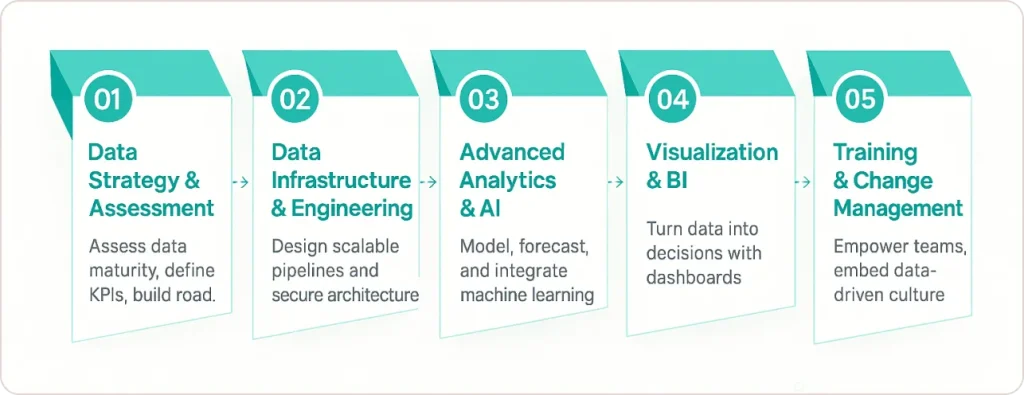
1. Data Strategy & Assessment
Every engagement starts with understanding your current state:
- Audit existing data sources, quality, and accessibility
- Identify gaps between current capabilities and business objectives
- Define clear KPIs aligned with strategic goals
- Create a phased roadmap with quick wins and long-term transformation
Why it matters: Without a clear strategy, analytics initiatives become expensive science projects that never deliver business value. A proper assessment ensures every investment directly supports your most critical objectives.
2. Data Infrastructure & Engineering
Big data analytics services require robust technical foundations:
- Design scalable data architecture (cloud, on-premises, or hybrid)
- Implement data pipelines for efficient ETL/ELT processes
- Establish data governance frameworks for security and compliance
- Integrate disparate systems into unified data platforms
Modern analytics in consulting leverages cloud-native architectures that scale with your business while maintaining enterprise-grade security. This is especially critical for industries like healthcare and financial services with strict compliance requirements.
Our data engineering services focus on building infrastructure that handles growing data volumes without performance degradation.
3. Advanced Analytics & AI Implementation
This is where strategy becomes actionable insight:
- Build predictive models for forecasting and scenario planning
- Implement machine learning algorithms for pattern recognition
- Create customer segmentation and propensity models
- Develop prescriptive analytics for automated decision-making
A data analysis consulting approach integrates these capabilities into your existing workflows, ensuring insights reach decision-makers at the right moment.
For example, our work with Awe Inspired demonstrates how advanced analytics reduces manual workload by 50% while improving inventory management accuracy.
4. Visualization & Business Intelligence
Insights locked in spreadsheets don’t drive action. Effective data analytics consulting for small business and enterprises alike requires intuitive visualization:
- Design executive dashboards for strategic oversight
- Create operational dashboards for daily decision-making
- Build self-service analytics that empower business users
- Implement mobile-optimized reporting for on-the-go access
Tools like Power BI, Tableau, and custom solutions transform complex data into visual stories that stakeholders actually understand and use. Our Power BI consulting services help organizations migrate from static Excel reports to dynamic, interactive dashboards.
5. Training & Change Management
Technology alone doesn’t create data-driven cultures:
- Train teams on analytics tools and data interpretation
- Establish data literacy programs across the organization
- Create centers of excellence for ongoing capability building
- Provide ongoing support and optimization
Forrester research indicates that 60% of employees will receive prompt engineering training in 2024, reflecting the growing need for data skills across all roles. The best data analytics consulting firms build internal capabilities so you’re not permanently dependent on external support.
Industry Applications: Where Analytics Consulting Creates Value
While the principles of analytics in consulting apply universally, implementation varies dramatically by industry. Here’s how different sectors leverage data analytics consulting:
Healthcare: Operational Excellence & Patient Outcomes
Healthcare organizations face unique challenges: fragmented systems, strict compliance requirements, and the need to balance cost control with quality care.
Analytics consulting applications:
- Predict patient admission volumes for optimal staffing
- Identify readmission risks for proactive intervention
- Optimize operating room scheduling and resource allocation
- Analyze treatment outcomes to improve clinical protocols
Our work demonstrates how healthcare operational efficiency improves through connected data systems that provide real-time visibility across departments.
Retail: Consumer Insights & Inventory Optimization
By studying the buying patterns of consumers, Walmart was prepared for the shift that took place in the US market in 2024. While retail companies started getting into bankruptcies, this retail giant realized that households with more than $100,000 annual income formed the clientele. And to retain them, they expanded their online business with more sophisticated clothes and mannequins.
According to recent industry analysis, CPG analytics trends in 2025 show AI-powered demand forecasting becoming table stakes for competitive retailers.
Financial Services: Risk Management & Customer Experience
Financial institutions must balance innovation with regulatory compliance while managing complex risk profiles.
Analytics consulting applications:
- Detect fraudulent transactions in real-time
- Model credit risk with alternative data sources
- Personalize banking experiences based on life stage and behavior
- Optimize branch locations and service offerings
Big data analytics services in financial services require specialized expertise in both analytics and regulatory compliance—a combination that in-house teams rarely possess.
Manufacturing: Predictive Maintenance & Supply Chain Optimization
Manufacturers increasingly rely on IoT sensors and connected equipment that generate massive data volumes.
Analytics consulting applications:
- Predict equipment failures before they cause downtime
- Optimize production schedules based on demand forecasts
- Monitor quality metrics to reduce defect rates
- Analyze supply chain vulnerabilities and alternative sourcing
The convergence of operational technology and information technology creates new opportunities for analytics in consulting that manufacturers are just beginning to explore.
Choosing the Right Data Analytics Consulting Firm
Not all analytics consulting firms deliver equal value. The difference between mediocre and exceptional results often comes down to these factors:
1. Proven Industry Expertise
Generic consultants deliver generic results. Look for firms with demonstrable experience in your specific industry. They should understand your regulatory environment, competitive dynamics, and unique operational challenges.
Red flag: Consultants who claim expertise across 15+ industries rarely excel in any of them.
Green flag: Case studies and client testimonials from companies similar to yours, with specific, measurable outcomes.
2. End-to-End Capabilities
The best data analytics consulting firms handle everything from strategy to implementation to ongoing optimization.
What to verify:
- Do they have data engineers, not just analysts?
- Can they implement solutions, or only recommend them?
- Do they provide training and change management support?
- Will they offer ongoing optimization after initial deployment?
Fragmented engagements that stop at recommendations rarely drive lasting transformation.
3. Technology Agnostic Approach
Beware of consultants who push specific tools regardless of your needs. The right data analytics consulting firm recommends solutions based on your requirements, existing infrastructure, and budget.
Key questions to ask:
- Which BI platforms do you work with? (They should list multiple)
- How do you decide between cloud and on-premises solutions?
- Can you integrate with our existing systems?
- What’s your approach when best-in-class tools don’t integrate well?
4. Transparent Pricing & ROI Focus
Data analysis consulting engagements should have clear deliverables, timelines, and success metrics.
Look for:
- Phased approaches with defined milestones
- Clear ROI projections based on your specific situation
- Pilot programs that prove value before full-scale investment
- Transparent pricing models (time & materials vs. fixed fee vs. value-based)
5. Cultural Fit & Communication Style
Analytics consultants become embedded in your team. Their communication style, work approach, and cultural fit matter as much as technical expertise.
Evaluation approach:
- Request working sessions with the actual consultants (not just sales teams)
- Ask about their project management methodology
- Understand their approach to stakeholder communication
- Verify they can explain complex concepts to non-technical audiences
Expert Insight
“Data democratization isn’t just about tools—it’s about empowering people across the organization to make evidence-based decisions. Organizations that successfully embed analytics into daily workflows gain sustainable competitive advantages that technology alone cannot replicate.” – Gareth Herschel, VP Analyst at Gartner
The Analytics Consulting Process: What to Expect
Understanding the typical engagement model helps set realistic expectations and ensures project success.
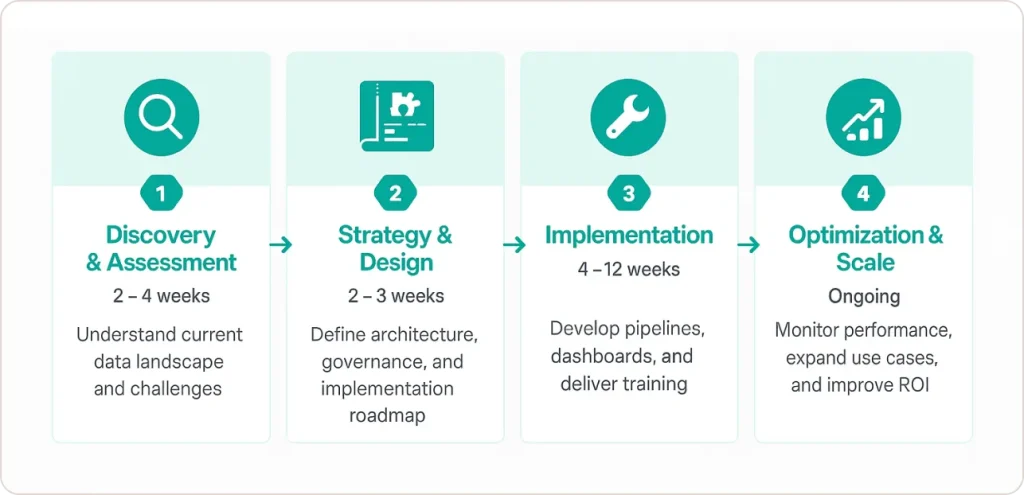
Phase 1: Discovery & Assessment (2-4 weeks)
The engagement starts with comprehensive understanding:
Activities:
- Stakeholder interviews across departments
- Data source inventory and quality assessment
- Current process documentation and pain point identification
- Technical infrastructure evaluation
- Initial KPI definition and success criteria
Deliverable: Detailed assessment report with prioritized recommendations and implementation roadmap.
Your role: Provide access to key stakeholders, existing documentation, and data systems.
Phase 2: Strategy & Design (2-3 weeks)
With baseline understanding, consultants design the target solution:
Activities:
- Detailed architecture design for data infrastructure
- Analytics use case prioritization based on business impact
- Tool selection and vendor evaluation
- Data governance framework definition
- Change management strategy
Deliverable: Comprehensive design document and implementation plan with resource requirements and timeline.
Your role: Review and approve design decisions, participate in vendor selection, identify internal resources for project support.
Phase 3: Implementation (4-12 weeks)
This is where strategy becomes reality:
Activities:
- Data pipeline development and testing
- Dashboard and report creation with iterative feedback
- Integration with existing systems
- User acceptance testing
- Training program delivery
Deliverable: Fully functional analytics environment, documentation, and trained internal users.
Your role: Provide feedback on deliverables, test solutions with real business scenarios, participate in training.
Phase 4: Optimization & Scale (Ongoing)
Analytics consulting doesn’t end at launch:
Activities:
- Performance monitoring and optimization
- New use case identification and implementation
- Advanced analytics capability building
- Ongoing training and support
- Regular business reviews to measure ROI
Deliverable: Continuous improvement of analytics capabilities aligned with evolving business needs.
Your role: Actively use analytics in decision-making, provide feedback on needed enhancements, champion data-driven culture.
Most organizations see positive ROI within 3-6 months, with impact accelerating as analytics capabilities mature.
Common Pitfalls to Avoid
Even with expert analytics consulting, certain mistakes can undermine success:
Pitfall 1: Starting Too Big
The mistake: Trying to build a comprehensive data warehouse and advanced analytics platform in a single initiative.
The fix: Start with a specific, high-value use case. Prove value quickly, then expand. Our approach emphasizes quick wins that fund ongoing transformation.
Pitfall 2: Focusing on Technology Over Business Outcomes
The mistake: Getting excited about AI and machine learning without clear business problems to solve.
The fix: Always start with the business question, then determine the analytics approach. Technology should serve strategy, not drive it.
Pitfall 3: Neglecting Data Quality
The mistake: Assuming existing data is “good enough” and jumping straight to analysis.
The fix: Invest in data quality from the start. Analytics on bad data produces confident-sounding wrong answers—worse than no analytics at all.
Pitfall 4: Underestimating Change Management
The mistake: Treating analytics as a technical project instead of an organizational transformation.
The fix: Allocate at least 30% of project effort to training, communication, and change management. Technology adoption requires cultural change.
Pitfall 5: Expecting Perfection Before Launch
The mistake: Delaying deployment until every feature is perfect and every edge case handled.
The fix: Launch with core functionality, gather user feedback, iterate rapidly. Perfection is the enemy of progress in analytics initiatives.
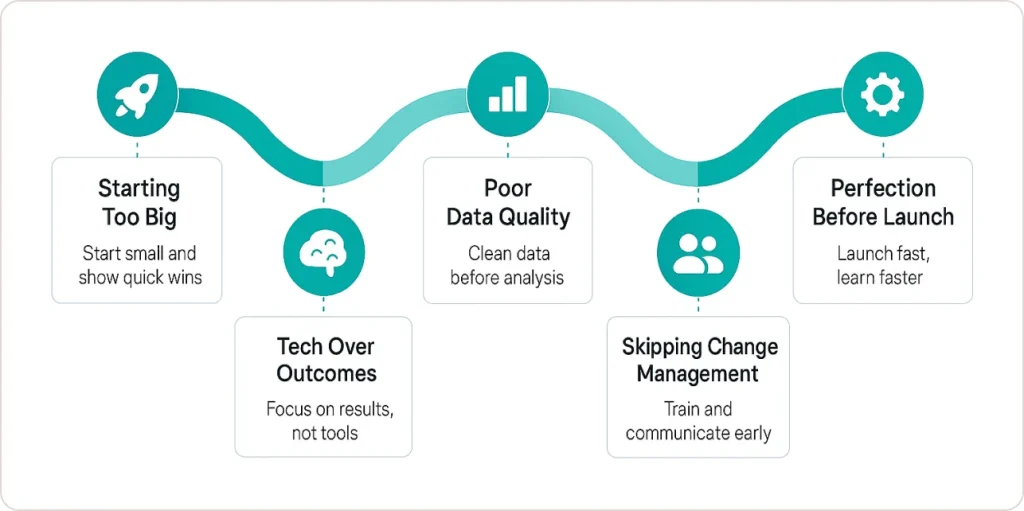
Conclusion: Your Next Step Toward Data-Driven Success
If you have already read here, you must know why it’s time to start collaborating with a suitable data & analytics firm. In whichever sector your business might be, data is available. If it’s analyzed correctly, it can boost your business.
The difference between struggling with data and leveraging it strategically often comes down to one decision: getting expert help.
If you’re experiencing any of these challenges, data analytics consulting can help:
- You have data but struggle to extract actionable insights
- Decision-making is based on intuition more than evidence
- Reporting consumes significant time but doesn’t drive action
- Different departments use conflicting numbers
- You’re unsure which analytics investments will deliver ROI
- You lack internal expertise for advanced analytics
The question isn’t whether to invest in analytics your competitors already are. The question is how to do it effectively, efficiently, and with measurable business impact.



